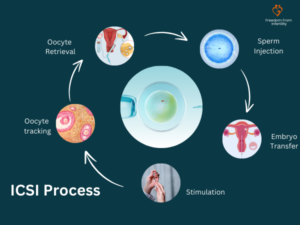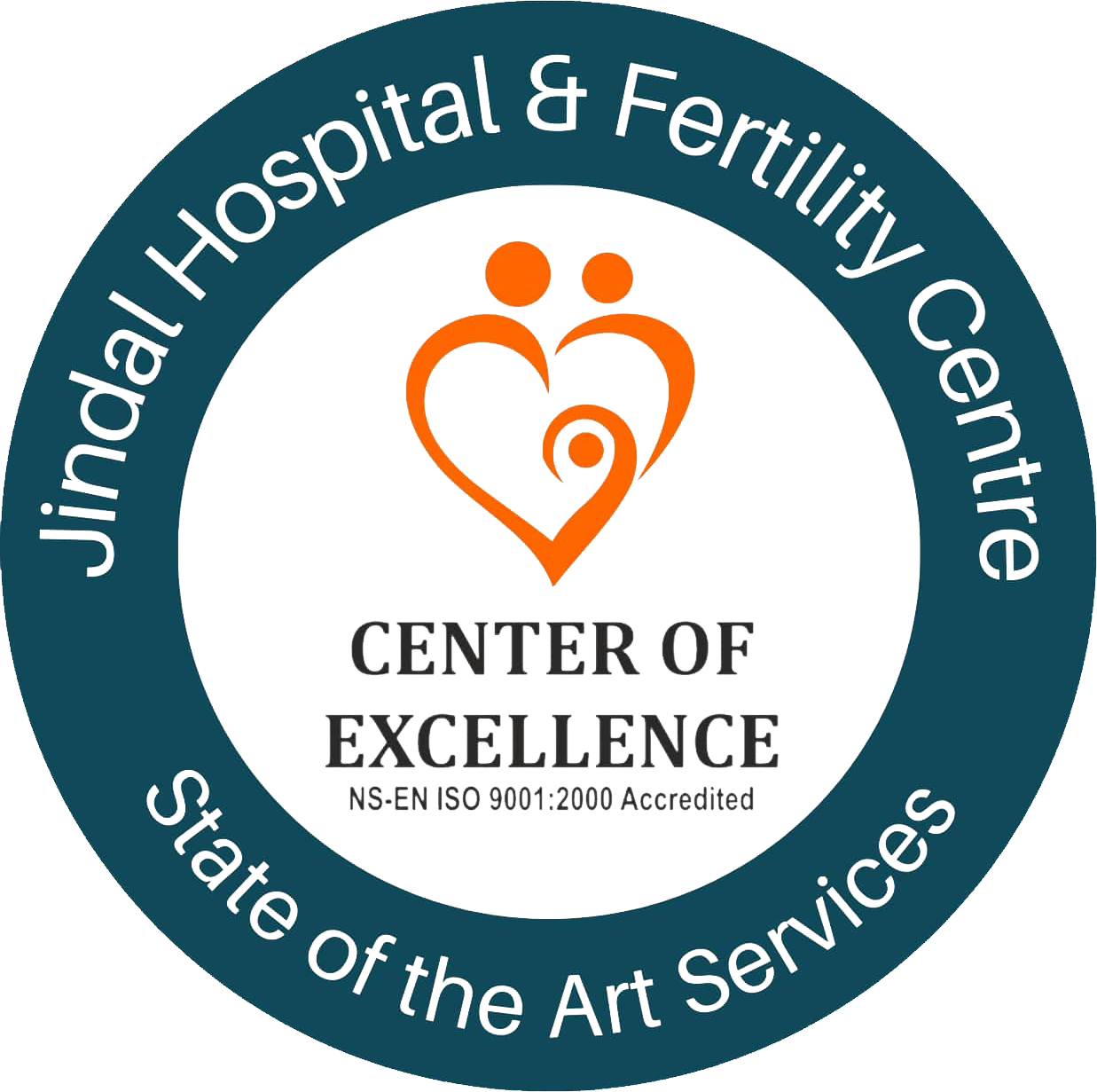
Overview
Why is it done?
ICSI Procedure
Why choose us
Do's & Don'ts
FAQs
Overview
 Comprehensive Guide to Intracytoplasmic Sperm Injection (ICSI) Treatment
Comprehensive Guide to Intracytoplasmic Sperm Injection (ICSI) Treatment
Introduction to ICSI Treatment:
Intracytoplasmic Sperm Injection (ICSI) stands as a beacon of hope for individuals and couples grappling with male factor infertility. This revolutionary assisted reproductive technology (ART) procedure involves the direct injection of a single sperm into an egg, overcoming various fertility challenges.
Who Benefits from ICSI?
ICSI serves as a vital solution for individuals facing the following fertility hurdles:
- Low Sperm Count:
- ICSI is a boon for men with a low sperm count, as it significantly enhances the chances of successful fertilisation.
- Poor Sperm Motility:
- Individuals with sperm exhibiting limited motility find ICSI invaluable, bypassing the challenge by directly injecting sperm into the egg.
- Abnormal Sperm Morphology:
- Irregularly shaped sperm can struggle to fertilise an egg naturally, making ICSI the ideal method to ensure successful fertilisation.
- Vasectomy Reversal:
- Following a vasectomy, ICSI offers hope by retrieving sperm directly from the testicles for fertilisation.
- Previous Failed Fertility Treatments:
- Couples who have experienced unsuccessful attempts with other treatments, such as intrauterine insemination (IUI), turn to ICSI as a promising alternative.
- Initial Consultation:
- Couples embark on their ICSI journey with an insightful consultation with a fertility specialist, determining the suitability of the procedure.
- Ovarian Stimulation:
- Women undergo ovarian stimulation, aided by hormone medications to produce multiple mature eggs, often referred to as ICSI stimulation.
- Egg Retrieval:
- A minimally invasive procedure retrieves eggs from the woman’s ovaries, conducted under local anaesthesia.
- Sperm Collection:
- The male partner provides a semen sample, meticulously analysed to select the healthiest and most viable sperm for injection.
- Sperm Preparation:
- In the laboratory, the selected sperm undergoes meticulous preparation, including washing and concentration for optimal fertilisation.
- Sperm Injection (ICSI):
- Using a precise fine needle, a single sperm is meticulously injected directly into each mature egg.
- Fertilisation Monitoring:
- The fertilised eggs (embryos) are vigilantly monitored in the laboratory for signs of successful fertilisation and early cell division.
- Embryo Transfer:
- After a few days of fertilisation, one or more healthy embryos are delicately transferred into the woman’s uterus through a small catheter.
- Pregnancy Testing:
- Approximately two weeks post-embryo transfer, a pregnancy test unveils the success of the ICSI procedure.
- ICSI boasts a remarkable success rate, with fertilisation rates ranging from 50% to 80%, particularly when administered by proficient professionals using cutting-edge techniques.
- The success rate of ICSI is akin to conventional IVF procedures, cementing its status as a pivotal option for couples grappling with male factor infertility.
- Multiple Pregnancies:
- ICSI carries a heightened risk of multiple pregnancies, necessitating cautious consideration and monitoring.
- Ovarian Hyperstimulation Syndrome (OHSS):
- In rare cases, ovarian stimulation may lead to OHSS, a condition characterised by swollen and painful ovaries.
- Bleeding & Infection:
- Minimal risks of bleeding or infection at the site of egg retrieval are present, requiring post-procedure vigilance.
- Birth Defects:
- Although rare, some studies suggest a slightly elevated risk of birth defects in babies conceived through ICSI.
- Failed Fertilisation:
- In exceptional cases, fertilisation may not occur despite meticulous ICSI procedures, necessitating further exploration.
- Emotional & Psychological Impact:
- The emotional journey of fertility treatment, including ICSI, can be challenging, prompting the need for holistic support.
Why is it done?
Understanding Intracytoplasmic Sperm Injection (ICSI) for Male Infertility
Introduction to ICSI for Male Infertility:
Intracytoplasmic Sperm Injection (ICSI) is a specialized treatment used when a man’s sperm faces challenges in fertilizing an egg, even with the assistance of In Vitro Fertilization (IVF). This advanced procedure significantly enhances the chances of conception for couples struggling with male infertility factors.
When is ICSI Recommended?
ICSI may be recommended in cases where male infertility issues hinder the natural fertilization process. These may include:
How ICSI Helps in Treating Male Infertility:
ICSI plays a crucial role in addressing various infertility issues, including:
The Procedure of ICSI:
Conclusion:
Intracytoplasmic Sperm Injection (ICSI) stands as a remarkable advancement in fertility treatment, offering hope to couples grappling with male infertility challenges. By directly addressing sperm-related obstacles to fertilization, ICSI significantly improves the chances of conception and successful pregnancy. For couples navigating male infertility issues, ICSI serves as a powerful tool, ensuring that the dream of parenthood can be realized with the aid of modern reproductive technologies.
Introduction to ICSI for Male Infertility:
Intracytoplasmic Sperm Injection (ICSI) is a specialized treatment used when a man’s sperm faces challenges in fertilizing an egg, even with the assistance of In Vitro Fertilization (IVF). This advanced procedure significantly enhances the chances of conception for couples struggling with male infertility factors.
When is ICSI Recommended?
ICSI may be recommended in cases where male infertility issues hinder the natural fertilization process. These may include:
- Low Sperm Count:
- Men with a low sperm count benefit from ICSI as it ensures that even a limited number of sperm can be used to fertilize the egg.
- Poor Sperm Motility:
- When sperm have difficulty in moving or swimming properly, ICSI provides a direct route for sperm to penetrate the egg.
- Azoospermia (Absence of Sperm):
- In cases where no sperm are present in the ejaculate, sperm can be extracted directly from the testicles or epididymis for ICSI.
- Erectile Dysfunction:
- ICSI offers a solution for men with erectile dysfunction, ensuring successful fertilization regardless of the inability to ejaculate normally.
- Unexplained Male Infertility:
- When the cause of male infertility is unclear, ICSI can bypass potential obstacles and increase the likelihood of fertilization.
How ICSI Helps in Treating Male Infertility:
ICSI plays a crucial role in addressing various infertility issues, including:
- Insufficient Sperm Production:
- In cases where the male partner produces insufficient sperm for procedures like intrauterine insemination (IUI) or conventional IVF.
- Abnormal Sperm Migration:
- ICSI ensures that sperm can directly reach the egg, bypassing any issues related to their natural movement.
- Poor Sperm-Egg Interaction:
- When sperm have difficulty in adhering to the egg’s surface, ICSI enables direct injection into the egg for fertilization.
- Blockages in Male Reproductive System:
- ICSI allows for successful fertilization even if sperm cannot naturally exit the male reproductive system due to blockages.
- Azoospermia including primary testicular failure:
- Sperms can be retrieved from testes and can be used for giving their own genetic babies to azoospermic men.
- Failed Conventional IVF Attempts:
- If traditional IVF procedures have failed to fertilize eggs using conventional methods, ICSI offers a more direct approach.
- Utilization of In Vitro Developed or Frozen Eggs:
- ICSI is also employed when using eggs that have been developed in vitro or previously frozen for fertility treatments.
The Procedure of ICSI:
- Sperm Selection:
- The most viable and healthy sperm are meticulously selected from the male partner’s semen sample.
- Egg Retrieval:
- The female partner undergoes a procedure to retrieve mature eggs from her ovaries.
- Sperm Injection:
- Using a fine needle, a single sperm is precisely injected into each mature egg, facilitating fertilization.
- Embryo Development:
- The fertilized eggs (embryos) are monitored in the laboratory for signs of successful fertilization and subsequent cell division.
- Embryo Transfer:
- Developed embryos are then delicately transferred into the woman’s uterus to establish pregnancy.
Conclusion:
Intracytoplasmic Sperm Injection (ICSI) stands as a remarkable advancement in fertility treatment, offering hope to couples grappling with male infertility challenges. By directly addressing sperm-related obstacles to fertilization, ICSI significantly improves the chances of conception and successful pregnancy. For couples navigating male infertility issues, ICSI serves as a powerful tool, ensuring that the dream of parenthood can be realized with the aid of modern reproductive technologies.
ICSI Procedure
The Procedure of ICSI:
Conclusion:
Intracytoplasmic Sperm Injection (ICSI) stands as a remarkable advancement in fertility treatment, offering hope to couples grappling with male infertility challenges. By directly addressing sperm-related obstacles to fertilization, ICSI significantly improves the chances of conception and successful pregnancy.
For couples navigating male infertility issues, ICSI serves as a powerful tool, ensuring that the dream of parenthood can be realized with the aid of modern reproductive technologies.
- Sperm Selection:
- The most viable and healthy sperm are meticulously selected from the male partner’s semen sample.
- Egg Retrieval:
- The female partner undergoes a procedure to retrieve mature eggs from her ovaries.
- Sperm Injection:
- Using a fine needle, a single sperm is precisely injected into each mature egg, facilitating fertilization.
- Embryo Development:
- The fertilized eggs (embryos) are monitored in the laboratory for signs of successful fertilization and subsequent cell division.
- Embryo Transfer:
- Developed embryos are then delicately transferred into the woman’s uterus to establish pregnancy.
Conclusion:
Intracytoplasmic Sperm Injection (ICSI) stands as a remarkable advancement in fertility treatment, offering hope to couples grappling with male infertility challenges. By directly addressing sperm-related obstacles to fertilization, ICSI significantly improves the chances of conception and successful pregnancy.
For couples navigating male infertility issues, ICSI serves as a powerful tool, ensuring that the dream of parenthood can be realized with the aid of modern reproductive technologies.
Why choose us
Best ICSI Centers in Meerut, Delhi, and India:
For individuals seeking the pinnacle of ICSI treatment excellence, consider Dr. Sunil Jindal & Dr. Anshu Jindal at Jindal Hospital & Fertility centre (Jindal IVF) at Meerut, Delhi, India.
For individuals seeking the pinnacle of ICSI treatment excellence, consider Dr. Sunil Jindal & Dr. Anshu Jindal at Jindal Hospital & Fertility centre (Jindal IVF) at Meerut, Delhi, India.
- Best ICSI Center in Meerut:
- Years of experience and expertise in ICSI at Jindal Hospital & Fertility centre (Jindal IVF) at Meerut, Delhi, India.
- Best ICSI Center in Delhi:
- Years of experience and expertise in ICSI at Jindal Hospital & Fertility centre (Jindal IVF) at Meerut, Delhi, India.
- Sunil Jindal a pioneer in laboratory, clinical & surgical andrology with a 35 years experience in this field.
Do's & Don'ts
Dos and Don’ts during ICSI Treatment:
Dos:
Dos:
- Dietary Considerations:
- Consult with Your Doctor: Seek guidance from your doctor at least three months prior to the scheduled ICSI procedure. Obtain a recommended diet chart tailored to enhance fertility and sperm quality.
- Focus on Proteins: Incorporate protein-rich foods into your diet. Proteins are considered superfoods that contribute to overall health and improve sperm quality. This ensures that you can provide the best sperm sample on the day of your ICSI treatment.
- Maintain a Healthy Lifestyle:
- Regular Exercise: Engage in regular, moderate exercise to support overall health and well-being. Physical activity can positively impact fertility.
- Adequate Sleep: Ensure you get enough restorative sleep, aiming for around 7-8 hours each night.
- Stay Informed and Involved:
- Attend Medical Appointments: Regularly attend appointments with your fertility specialist to stay updated on the progress of your treatment.
- Ask Questions: Don’t hesitate to ask questions or seek clarification about any aspect of your ICSI treatment. Understanding the process can help alleviate anxiety and stress.
- Manage Stress:
- Stress Reduction Techniques: Explore stress-reducing techniques such as yoga, meditation, or mindfulness exercises. Stress can impact fertility, so finding ways to relax can be beneficial.
- Follow Doctor’s Instructions:
- Medication Compliance: Adhere to your prescribed medication schedule diligently. This ensures optimal response to the treatment protocol.
- Alcohol Consumption:
- Reduce or Avoid Alcohol: Minimize alcohol intake or abstain completely for at least three months leading up to your ICSI treatment. Alcohol consumption can negatively affect sperm quality and overall fertility.
- Tobacco and Smoking:
- Quit Smoking: Smoking has detrimental effects on reproductive health, affecting sperm quality and overall fertility. Quit smoking well in advance of your ICSI procedure to improve chances of success.
- Caffeine Intake:
- Limit Caffeine Consumption: While moderate caffeine intake is generally considered safe, excessive consumption may impact fertility. Consider reducing caffeine intake or switching to decaffeinated options.
- Unhealthy Habits:
- Avoid Unhealthy Foods: Minimize intake of processed foods, sugary snacks, and unhealthy fats. Opt for a balanced diet rich in fruits, vegetables, whole grains, and lean proteins.
- Strenuous Activities:
- Avoid Overexertion: Refrain from engaging in strenuous physical activities or heavy lifting that may strain the body during the ICSI treatment cycle.
- Exposure to Harmful Substances:
- Limit Exposure to Toxins: Avoid exposure to environmental toxins, pesticides, and chemicals that may impact fertility.
- Stress and Anxiety:
- Avoid Stressful Situations: Try to minimize exposure to stressful situations and environments. High levels of stress can affect hormone levels and fertility.
FAQs
FAQs About ICSI
- What is ICSI?
- ICSI, which stands for Intracytoplasmic Sperm Injection, is an assisted reproductive technology (ART) procedure used in cases of severe male infertility or when other fertility treatments such as IVF have not been successful. It involves the direct injection of a single sperm into an egg to facilitate fertilization.
- How Does ICSI Differ from IVF?
- In traditional IVF (In Vitro Fertilization), eggs and sperm are mixed together in a dish to allow fertilization to occur naturally. In contrast, ICSI involves the direct injection of a sperm into an egg, bypassing the need for the sperm to penetrate the egg on its own.
- When is ICSI Recommended?
- ICSI may be recommended in cases of male factor infertility, such as low sperm count, poor sperm motility, or abnormal sperm morphology. It is also used when previous IVF attempts have resulted in failed fertilization.
- How is the ICSI Procedure Performed?
- The ICSI procedure is performed in conjunction with IVF. After the female partner undergoes ovarian stimulation and egg retrieval, mature eggs are retrieved from the ovaries. A single sperm is then selected and injected directly into each mature egg using a fine needle.
- What are the Success Rates of ICSI?
- The success rates of ICSI can vary depending on various factors, including the age of the female partner, the quality of the eggs, and the expertise of the fertility clinic. On average, the success rates for ICSI are comparable to those of traditional IVF.
- Are There Risks or Complications Associated with ICSI?
- While ICSI is generally considered safe, there are some risks and potential complications to be aware of. These may include the risk of damage to the egg or embryo during the injection process, as well as a slightly increased risk of certain genetic disorders in offspring.
- Can ICSI Result in Multiple Pregnancies?
- As with traditional IVF, there is a risk of multiple pregnancies with ICSI. Your fertility specialist will carefully monitor the number of embryos transferred to minimize this risk and increase the chances of a healthy singleton pregnancy.
- How Long Does the ICSI Procedure Take?
- The actual ICSI procedure, where the sperm is injected into the egg, only takes a few minutes per egg. However, the entire IVF/ICSI process, from ovarian stimulation to embryo transfer, typically spans several weeks.
- What Happens After the ICSI Procedure?
- After the sperm has been successfully injected into the eggs, the embryos are monitored for growth and development in the laboratory. Healthy embryos are then selected for transfer into the uterus, usually within 3 to 5 days after fertilization.
- Is ICSI Expensive?
- ICSI is an additional procedure that is often offered as part of the IVF process. The cost of ICSI can vary depending on the fertility clinic and any additional services or medications required. It is essential to discuss the financial aspects with your clinic beforehand.

